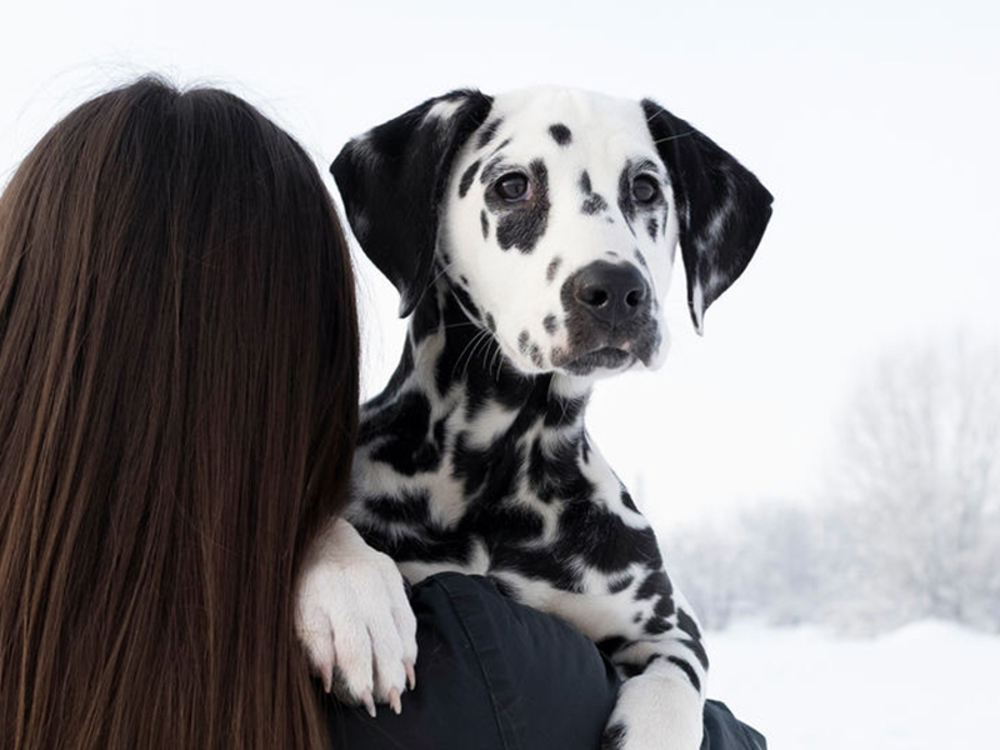
Research shows that 40 per cent of owners notice a change in their dog’s mood during the Christmas period, including appearing stressed by unusual people, noises and/or routines, and appearing unhappy. Similarly, nearly a quarter of owners (23 per cent) reported unusual behaviour from their dog during the festive season, such as destroying presents or decorations, and eating food from the dinner table. Almost one in five (18 per cent) also admit that their dog’s routine is disrupted over Christmas, either through being neglected with less play or attention, not having a walk on Christmas Day, or getting left at home more often than usual.
For many dogs, Christmas can be a stressful time, especially if the household changes significantly. This could mean lots of adjustments, especially for a young or sensitive dog, but you can do lots to help.
- Get your dog into a routine that you will be able to keep to during the Christmas period e.g. exercise, food, toilet time, play time. Make sure you keep to it during the festivities
- Recap training exercises that you will need - such as leave, settle, stay, go to bed/crate, come, walk on a loose lead
- Change things gradually when decorating or moving things around in your home – try to keep changes minimal to minimise the impact on your dog
- Make sure your dog has a safe haven (e.g. crate, bed, room) where they can go to be away from everything else
- Monitor temperature - some rooms get very hot at Christmas, so make sure your dog does not overheat, and remember that anxious dogs can be more prone to overheating. Conversely, if your dog is in the car or outside for some time out, make sure that they are not getting too cold
- When meeting new people, ask them to come in and sit down first before your dog goes into a room with the people they don’t know - this way they don’t seem so large or intimidating. Allow your dog to say hello at their own speed and give people treats to give to your dog if you think it might help. It can help if they just drop treats by their feet rather than trying to get your dog to come right up to them. Ask people not to pursue your dog to try to say hello before your dog is feeling confident with them
- Young people can be very noisy, excitable and unpredictable at this time of year and this may be difficult for your dog. Try to educate children, but at key times, your dog is probably better off in its safe haven
- Many sensitive/anxious dogs are sound sensitive too. Households can be very noisy, so try to shield your dog from the worst of this with planning, making sure they are well exercised and tired, and then your dog can be tucked up in their safe haven while you enjoy the fun
- It is quite common for there to be fireworks over the Christmas and New Year period. Take a look at our fireworks advice for further tips
Going away?
- If you are going away with your dog for Christmas, make sure you have practiced safe travel and take blankets that smell of home with you to help settle your dog
- Crate training is ideal if you are away from home – it means your dog can take their very own safe haven wherever they go
- Have a bag of toys and games to help keep your dog occupied and play with them – don’t just leave your dog to play alone. If your dog normally gets a lot of your attention, they could feel very isolated if you expect them to be alone for long periods
- Do your homework and find some interesting walks around the area where you are staying. Head for areas where dogs have to be kept on a lead so that your dog is less likely to get unwanted encounters from other dogs, or maybe find a local dog field that you could hire for an hour of fun with your dog
- Meeting new people away from home can be just as hard and sometimes much harder for the sensitive or anxious dog. As above, allow your dog to say hello at their own speed. Saying hello should not be compulsory - let your dog come around in their own time or let them opt out if they prefer
- Make sure you have the emergency numbers of a local vets just in case
- If your dog needs medication make sure you take it with you, along with your dog’s usual bowls, food and treats
